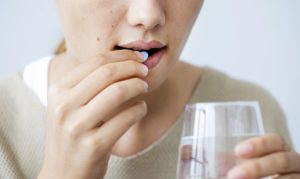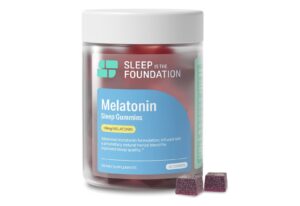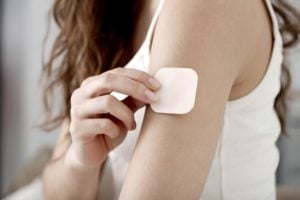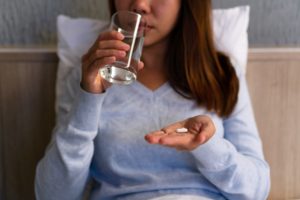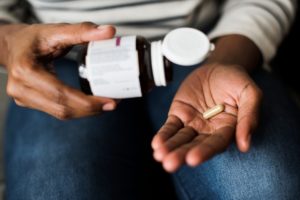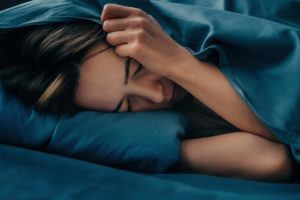Melatonin and COVID
More than two years after the World Health Organization declared the COVID-19 pandemic, COVID-19 continues to circulate in the U.S. and worldwide . COVID-19 infection can cause a range of symptoms including fever, cough, and shortness of breath. Some people also experience serious health complications and long-term medical issues including insomnia and other sleep problems.
People may wonder if taking melatonin supplements can prevent COVID-19 infection or reduce sleep-related symptoms. Currently, there is not enough evidence to support using melatonin for the treatment or prevention of COVID-19, but research is ongoing to better understand the relationship between melatonin and the body’s response to viral infections and COVID-19.
We’ll provide an overview of melatonin, including its uses and risks. In addition, we’ll cover the relationship between sleep and immunity, and discuss early results from research into melatonin use in COVID-19 infection.
Get to the root of your sleep problems
Melatonin can help, but it’s best to find the source of your sleep issues. Answer these questions to better understand your sleep.
What Is Melatonin?
Melatonin is a hormone released by the human brain that makes people feel sleepy . Melatonin is involved in circadian rhythm, the internal process that helps people fall asleep at night and wake up during the day.
While the brain naturally makes melatonin, it is also sold over the counter as a dietary supplement in the U.S. In the European Union and some other countries, melatonin is only available with a prescription.
Melatonin supplements may be used as sleep aids for people with jet lag, insomnia, or other sleep disorders. Studies have found that taking melatonin at bedtime helps people with jet lag feel more alert during the day and adjust to their new time zone more quickly . In addition, melatonin may help people with insomnia fall asleep faster and sleep longer.
Can Melatonin Prevent COVID-19?
There is no scientific evidence that melatonin supplements can help prevent a COVID-19 infection. Additionally, U.S. guidelines for COVID-19 prevention do not address the use of melatonin supplements.
The National Institutes for Health and Centers for Disease Control and Prevention (CDC) recommend that Americans take the following steps to prevent COVID-19 infection:
- Get a complete COVID-19 vaccine series and booster , if eligible
- Frequently wash hands
- Use high-quality ventilation and air filters in indoor spaces
- Socialize outdoors when possible
- Avoid contact with people who have or may have COVID-19
The CDC also recommends that people wear masks or respirators outside their homes and maintain social distancing if they live in communities with medium or high levels of COVID-19.
Individuals with weak immune systems or who cannot receive COVID-19 vaccines due to medical reasons should talk to their doctors about whether they are also eligible for pre-exposure prevention shots .
How Does Sleep Affect Immunity?
Sleep is important for a healthy immune system, in part by helping to keep cortisol levels and the sympathetic nervous system in balance. Cortisol is often referred to as the stress hormone and has many effects on the body, including reducing inflammation. Similarly, the sympathetic nervous system affects the immune system and other body functions.
Sleep deprivation weakens the immune system in several ways. Researchers have found that people have lower levels of natural killer (NK) cells after losing a substantial amount of sleep and that existing NK cells are less able to fight disease . NK cells are white blood cells that kill cells infected with viruses and other germs. People with low levels of functional NK cells are at high risk of viral infection.
People who are sleep deprived also have higher levels of cytokines. Cytokines are proteins that encourage inflammation. High levels of cytokines in people with COVID-19 have been linked to worse health outcomes . In fact, some people with COVID-19 develop an unusually strong and potentially life-threatening condition involving inflammation with high levels of cytokines and high fevers, called a cytokine storm.
Available research suggests that sleep-deprived people may be at higher risk of infections. For example, sleep-deprived people develop fewer antibodies in response to the influenza vaccine compared to fully-rested people. In addition, people who sleep less than seven hours may be more likely to develop the common cold after being exposed to a cold-causing virus.

Does Melatonin Help COVID-19 Symptoms?
Current guidelines for treating COVID-19 do not include melatonin. However, some experts have suggested that melatonin might be helpful as a supportive treatment in people with COVID-19. Melatonin does not directly kill or weaken the virus that causes COVID-19, but it might address some of the virus’s effects on the body.
Many people struggle with sleep difficulties after recovering from COVID-19. Studies have found that difficulty sleeping is one of the most common symptoms of “long COVID.” Up to one in four people hospitalized with COVID-19 may still have sleep disturbances six months after their hospitalization. As melatonin may be used to treat insomnia, people with lingering sleep difficulties after a COVID-19 infection can discuss the use of melatonin with their doctor.
In addition to its effects on sleep, melatonin reduces inflammation. Some experts suspect that melatonin could help reduce the cytokine storm that occurs in some severe cases of COVID-19. Melatonin also has antioxidant effects that may prevent damage to cells and help hearts and lungs to heal after injury.
There are currently few high-quality studies of the effectiveness of melatonin as a treatment for COVID-19. However, research to date suggests that people with COVID-19 who are given melatonin in addition to standard COVID-19 treatment may recover more quickly , have fewer blood clots , and may be less likely to die than those with standard treatment alone. Studies in animals have also found that melatonin reduces the severity of several viral infections.
While these studies are promising, additional research is needed to find out whether melatonin is safe and effective for treating COVID-19. Until that time, people infected with COVID-19 should not take melatonin as a treatment without first speaking with their doctor. Furthermore, melatonin should not be taken in place of medications prescribed by a doctor.
Does COVID-19 Affect Melatonin?
Experts don’t yet know whether COVID-19 infection has the same effect on naturally-occurring melatonin levels. It is clear that other viral infections, such as influenza, turn off or use up genes and proteins that are needed for the body to make melatonin. This results in lower levels of melatonin being released during certain viral infections.
Does Melatonin Interact with the COVID-19 Vaccine?
There are no known interactions between melatonin supplements and COVID-19 vaccines. There are only two known contraindications to the COVID-19 vaccine:
- An allergic reaction to a previous vaccine that included components also present in the COVID-19 vaccine
- A history of blood clotting or low platelet counts after a previous COVID-19 vaccine
Are There Health Risks to Taking Melatonin?
Medical experts haven’t fully determined the health risks of taking melatonin supplements. However, available evidence suggests that melatonin is probably safe for short-term use in most healthy adults, and may be safe to take for up to two years.
The most common side effects of melatonin supplements include:
- Daytime tiredness
- Dizziness
- Headache
- Realistic dreams and nightmares
- Irritability
- Temporary feelings of depression
- Nausea
- Stomach cramps
There are special concerns about melatonin use in children and other groups of people. People with diabetes, depression, bleeding disorders, or seizure disorders should speak with their doctors before taking melatonin supplements. Additionally, people who are pregnant, trying to become pregnant, or breastfeeding should discuss melatonin use with their doctor.
Melatonin may interact with some prescription medications. People taking any of the following medications should speak with their doctors before taking melatonin:
- Blood pressure medicine
- Medicine to weaken the immune system
- Blood thinners
Finally, it’s important to remember that melatonin supplements are not regulated by the U.S. Food and Drug Administration (FDA). This means that melatonin supplements may contain melatonin levels that are much higher or lower than what is listed on the label.

Still have questions? Ask our community!
Join our Sleep Care Community — a trusted hub of sleep health professionals, product specialists, and people just like you. Whether you need expert sleep advice for your insomnia or you’re searching for the perfect mattress, we’ve got you covered. Get personalized guidance from the experts who know sleep best.
Medical Disclaimer: The content on this page should not be taken as medical advice or used as a recommendation for any specific treatment or medication. Always consult your doctor before taking a new medication or changing your current treatment.
References
25 Sources
-
World Health Organization. (2022, September 21). Weekly epidemiological update on COVID-19 – 21 September 2022., Retrieved October 3, 2022, from
https://www.who.int/publications/m/item/weekly-epidemiological-update-on-covid-19---21-september-2022 -
Tesini, B. L. (2022, August). COVID-19. Merck Manual Consumer Version., Retrieved September 23, 2022, from
https://www.merckmanuals.com/home/infections/covid-19/covid-19 -
Mouffak, S., Shubbar, Q., Saleh, E., & El-Awady, R. (2021). Recent advances in management of COVID-19: A review. Biomedicine & Pharmacotherapy, 143, 112107.
https://pubmed.ncbi.nlm.nih.gov/34488083/ -
Shane-McWhorter, L. (2022, January). Melatonin. Merck Manual Consumer Version., Retrieved September 23, 2022, from
https://www.merckmanuals.com/home/special-subjects/dietary-supplements-and-vitamins/melatonin -
National Institute of General Medical Sciences. (2022, May 4). Circadian rhythms., Retrieved September 23, 2022, from
https://www.nigms.nih.gov/education/fact-sheets/Pages/circadian-rhythms.aspx -
Neubauer, D. N. (2022, September 12). Pharmacotherapy for insomnia in adults. In R. Benca & J. G. Elmore (Eds.). UpToDate., Retrieved September 23, 2022, from
https://www.uptodate.com/contents/pharmacotherapy-for-insomnia-in-adults -
Goldstein, C. A. (2022, April 5). Jet lag. In R. Benca (Ed.). UpToDate., Retrieved September 23, 2022, from
https://www.uptodate.com/contents/jet-lag -
National Institutes of Health. (2022, September 26). Prevention of SARS-CoV-2 infection., Retrieved October 3, 2022, from
https://www.covid19treatmentguidelines.nih.gov/overview/prevention-of-sars-cov-2/ -
National Center for Immunization and Respiratory Diseases, Division of Viral Diseases. (2022, August 11). How to protect yourself and others. Centers for Disease Control and Prevention., Retrieved September 23, 2022, from
https://www.cdc.gov/coronavirus/2019-ncov/prevent-getting-sick/prevention.html -
National Center for Immunization and Respiratory Diseases, Division of Viral Diseases. (2022, September 2). Pre-exposure prophylaxis with Evusheld. Centers for Disease Control and Prevention., Retrieved September 23, 2022, from
https://www.cdc.gov/coronavirus/2019-ncov/hcp/clinical-care/pre-exposure-prophylaxis.html -
LeBouef, T., Yaker, Z., & Whited, L. (2022, May 8). Physiology, autonomic nervous system. In StatPearls. StatPearls Publishing., Retrieved September 23, 2022, from
https://www.ncbi.nlm.nih.gov/books/NBK538516/ -
Orange J. S. (2013). Natural killer cell deficiency. The Journal of Allergy and Clinical Immunology, 132(3), 515–525.
https://pubmed.ncbi.nlm.nih.gov/23993353/ -
Rahman, M., & Bordoni, B. (2022, February 13). Histology, natural killer cells. In StatPearls. StatPearls Publishing., Retrieved September 23, 2022, from
https://www.ncbi.nlm.nih.gov/books/NBK565844/ -
National Institute for Occupational Safety and Health. (2020, March 31). Sleep and the immune system. Centers for Disease Control and Prevention., Retrieved September 23, 2022, from
https://www.cdc.gov/niosh/work-hour-training-for-nurses/longhours/mod2/05.html -
McIntosh, K. (2022, September 21). COVID-19: Clinical features. In M. S. Hirsch (Ed.). UpToDate., Retrieved September 23, 2022, from
https://www.uptodate.com/contents/covid-19-clinical-features -
Cirelli, C. (2022, October 1). Insufficient sleep: Definition, epidemiology, and adverse outcomes. In R. Benca (Ed.). UpToDate., Retrieved September 23, 2022, from
https://www.uptodate.com/contents/insufficient-sleep-definition-epidemiology-and-adverse-outcomes -
Reiter, R. J., Sharma, R., Simko, F., Dominguez-Rodriguez, A., Tesarik, J., Neel, R. L., Slominski, A. T., Kleszczynski, K., Martin-Gimenez, V. M., Manucha, W., & Cardinali, D. P. (2022). Melatonin: Highlighting its use as a potential treatment for SARS-CoV-2 infection. Cellular and Molecular Life Sciences, 79(3), 143.
https://pubmed.ncbi.nlm.nih.gov/35187603/ -
Vlachou, M., Siamidi, A., Dedeloudi, A., Konstantinidou, S. K., & Papanastasiou, I. P. (2021). Pineal hormone melatonin as an adjuvant treatment for COVID-19 (Review). International Journal of Molecular Medicine, 47(4), 47.
https://pubmed.ncbi.nlm.nih.gov/33576451/ -
Chippa, V., Aleem, A., & Anjum, F. (2022, June 19). Post acute coronavirus (COVID-19) syndrome. In StatPearls. StatPearls Publishing., Retrieved September 23, 2022, from
https://www.ncbi.nlm.nih.gov/books/NBK570608/ -
Su, W. L., Wu, C. C., Wu, S. V., Lee, M. C., Liao, M. T., Lu, K. C., & Lu, C. L. (2022). A review of the potential effects of melatonin in compromised mitochondrial redox activities in elderly patients with COVID-19. Frontiers in Nutrition, 9, 865321.
https://pubmed.ncbi.nlm.nih.gov/35795579/ -
Fogleman, C., Cohen, D., Mercier, A., Farrell, D., Rutz, J., Bresz, K., & Vernon, T. (2022). A pilot of a randomized control trial of melatonin and vitamin C for mild-to-moderate COVID-19. Journal of the American Board of Family Medicine, 35(4), 695–707.
https://pubmed.ncbi.nlm.nih.gov/35896462/ -
Hasan, Z. T., Atrakji, D., & Mehuaiden, D. (2022). The effect of melatonin on thrombosis, sepsis and mortality rate in COVID-19 patients. International Journal of Infectious Diseases, 114, 79–84.
https://pubmed.ncbi.nlm.nih.gov/34653660/ -
Cross, K. M., Landis, D. M., Sehgal, L., & Payne, J. D. (2021). Melatonin for the early treatment of COVID-19: A narrative review of current evidence and possible efficacy. Endocrine Practice, 27(8), 850–855.
https://pubmed.ncbi.nlm.nih.gov/34119679/ -
Edwards, K. M., & Orenstein W. A. (2022, September 7). COVID-19: Vaccines. In M. S. Hirsch (Ed.). UpToDate., Retrieved October 3, 2022, from
https://www.uptodate.com/contents/covid-19-vaccines -
Savage, R. A., Zafar, N., Yohannan, S. & Miller, J. M. (2021, August 15). Melatonin. In StatPearls. StatPearls Publishing., Retrieved September 23, 2022, from
https://www.ncbi.nlm.nih.gov/books/NBK534823/







